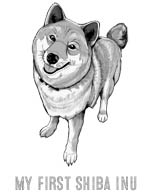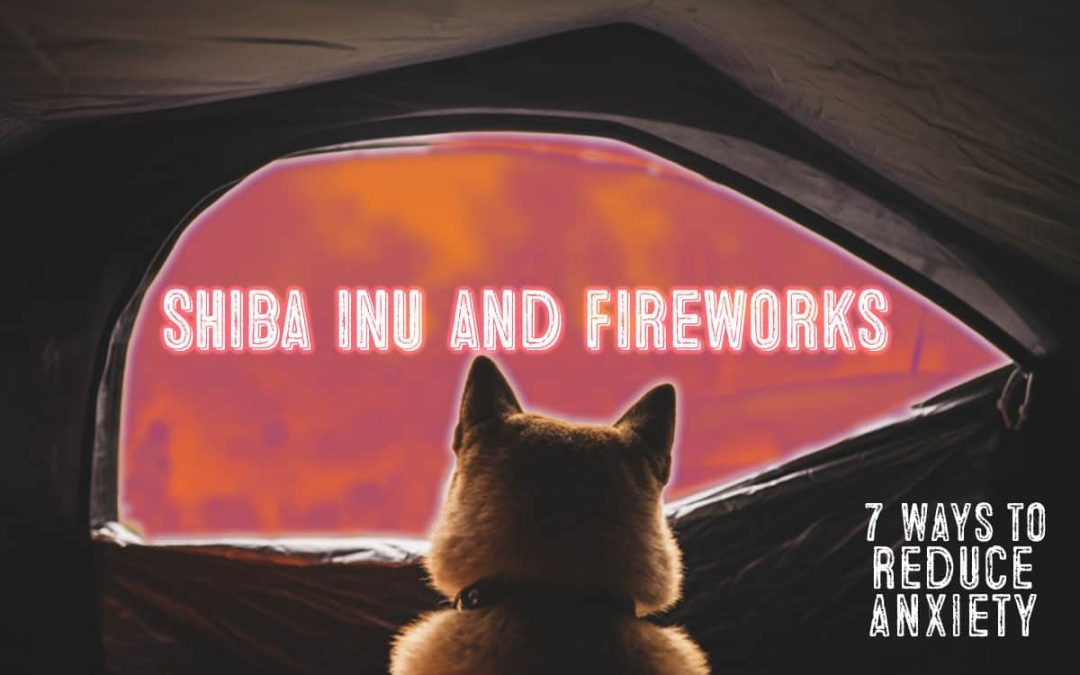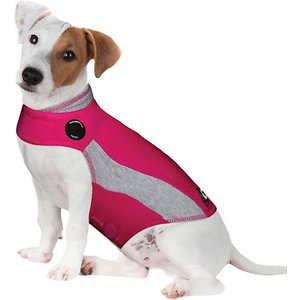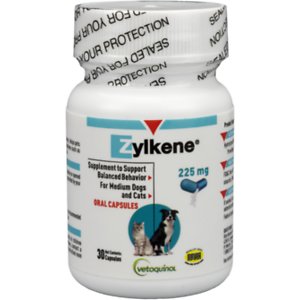On occasion, our posts contain affiliate links. However, we only recommend products that we truly believe in. For more information, visit my privacy policy page.
Fireworks can make confident and cocky Shibas tremble in absolute terror.
They can’t help it though.
All dogs are genetically wired to be concerned about loud noises that could potentially threaten their lives.
Serious long term consequences such as chronic anxiety, weakened immune systems occur when owners fail to address the problem from the beginning. Either because they don’t take it seriously or they just don’t know how.
Failing to address the fear issue from the beginning usually causes a cascade of other issues - more fears develop, fears are transferred to other household dogs.
Also fueling the problem is that many veterinarians fail to screen for noise anxiety at routine checkups.
Fortunately though, recent veterinary publications have begun to bring this issue to attention.
Hopefully, more veterinarians will include noise anxiety in their screenings and more dog owners will bring up this conversation with their vets as well.
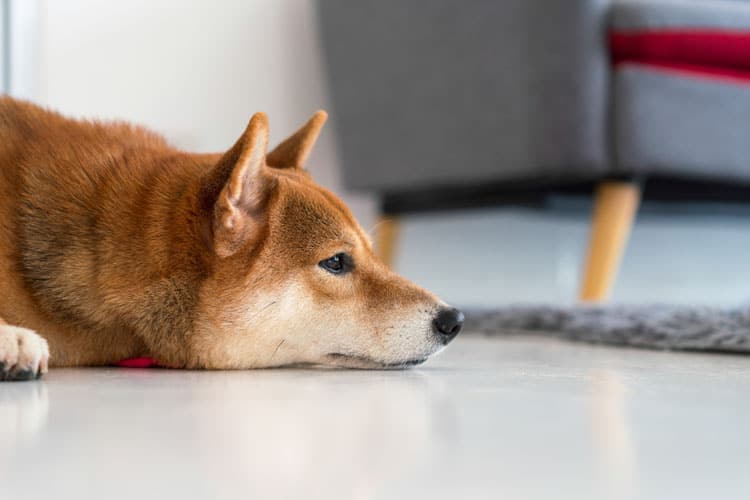
What You Need To Do
If your Shiba Inu has noise-anxiety don’t delay creating a plan to address it. This article contains all the information you need to customize your Shiba’s treatment protocol to ensure the best results.
We poured over dozens and dozens of clinical studies to provide you with scientifically-backed tips that actually work.
So let’s get started. Your Shiba/s is counting on you.
How To Reduce Your Shiba's Noise Anxiety - 7 Actions To Take Now
1. Visit Your Vet
2. Have Vet-prescribed Medication Handy
3. Create Safe Space For Your Shiba
4. Implement "Ad-Hoc" Counterconditioning
5. Be There For your Shiba - Without Coddling
6. Separate Other Dogs Depending on Fear Level
7. What About Thundershirts, DAP Collars, ETC?
1. Visit Your Vet

Your veterinarian can determine if your Shiba is suffering from underlying pain that is exacerbated during noise events. Your veterinarian can also prescribe medication to ease anxiety and fear.
Noise anxiety is a serious disorder that nearly 50% of the dog population suffers from.
Many dog owners fail to bring this up to their veterinarians for various reasons - they don’t think it’s treatable, or they forgot about it as it only happens at certain times. Likewise, most veterinarians do not routinely ask clients about this common disorder.
With this obvious disconnect between dog owner and veterinarian, it’s understandable why so many dogs continue to go undiagnosed and suffer in silence with no one to turn to.
Noise aversion is similar to panic attacks in humans and repeated exposure to these attacks can be detrimental for both the dogs and humans health.
There have been studies that show a link between noise anxiety and pain in older canines.
For example, if a dog suddenly stiffens and or engages in fast movements, these actions could cause underlying pain to flare up. Thus, the dog will then associate noise events to pain further worsening the anxiety.
Your veterinarian can help you determine if pharmaceutical intervention could benefit your Shiba.
2. Have Vet Prescribed Meds Available If Necessary

Many dog owners are hesitant to administer medication without trying alternative methods first (supplements, anxiety wraps, etc)
However it’s important to note that most of these “other” methods have very little proof of efficacy.
So if your Shiba's fear is serious enough to affect his or her well-being - then it’s serious enough to treat with proven medications. Or at least until the issue can be thwarted with other therapies such as behavior modification.
A new medication called Sileo released in 2016, is the first medication FDA approved to treat canine noise aversion. The medication works by reducing anxiety without sedating the dog. Initial studies have found the medication to be effective, safe, and well tolerated by dogs.
Other medications your vet may discuss include Benzodipadenes, SSRI’s and Trazadone.
SSRI’s are usually prescribed to dogs who have chronic anxiety issues and must be taken for an extended time before improvement is apparent. It’s not a medication that will help instantly.
Even if your Shiba only exhibits noise anxiety a few times a year - it'd still be a good idea to have medication on hand to reduce the chance of your dog’s fear increasing over time.
Medications such as Sileo and Trazadone are highly effective in treating noise-related anxiety. If your Shiba’s fear causes noticeable distress - these are the two medications to inquire about first.
3. Create a Safe "Den-like" Space For Your Shiba
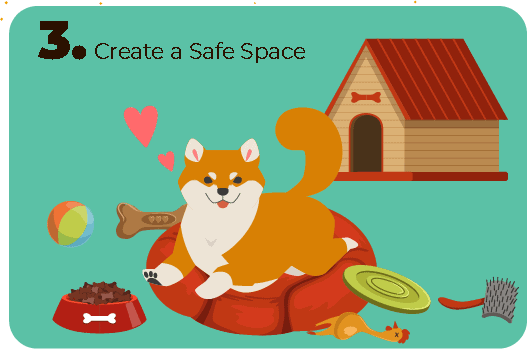
Make sure your Shiba has a “go-to” safe place that’s comfortable and quiet. This could be an area that already exists like a crate, dog house, or just a favorite place around the house.
Ideally the area should be “den-like” - cozy and dark. If your Shiba already feels right at home in a crate - make it darker by simply covering it with a sheet or blanket.
If your Shiba only has a bed, look into moving it to a place more enclosed, such as a closet or other nook, cranny in the home.
Additionally, try to find the quietest area of the house to designate as your Shiba’s safe space.
During noise events, close all windows and doors if possible drown the noise out. White noise and relaxing music can also be helpful.
Extra points to you if you look into soundproofing your dog's "house" or enclosure. We'll probably have a blog post on this subject in the near future.
4. Implement "Ad Hoc" Counterconditioning During Noise Events
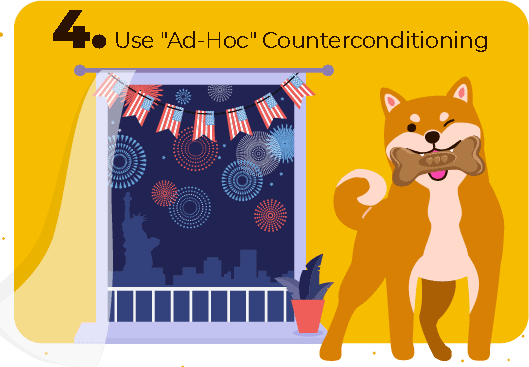
Behavior modification is one of the most effective ways of helping your Shiba overcome noise anxiety.
In fact, many studies have proven this point.
But The Problem Is…
Many dog owners don’t know how to implement behavior modification techniques (B.M.T.) correctly. B.M.T. must be done correctly to prevent the dog’s fears from getting worse.
B.M.T. also takes a hefty time commitment - both to learn and to execute. However, if you’re committed to learning this technique, there’s a multitude of resources to help you along the way, including our own guide.
An alternative is to hire a CAAB, Certified Applied Animal Behavioral Therapist or an Associate Certified Applied Animal Behaviorist (ACAAB) - but this would leave out a lot of dog owners who can’t afford the cost.
Our Recommendation…
We definitely recommend using B.M.T. counterconditioning to help your Shiba get over their noise-aversion phobias - especially if it’s severe.
Start with implementing “ad-hoc” B.M.T. of counter conditioning. Basically, you’d be using counter conditioning techniques during the noise event.
So, when the fireworks are going off, you’d be rewarding your Shiba with his or her favorite treat. Of course, make sure you’ve also provided a safe place first, and attempted to drown out the sound with music or white noise.
Also to remember to have the right attitude and make the noise event fun and positive.
For moderate, to severe cases, veterinarian prescribed medication should also be used adjunctly with this therapy. Hopefully, your Shiba will improve at some point where less medication would be needed.
5. Be There For Your Shiba - Without Coddling or Scolding
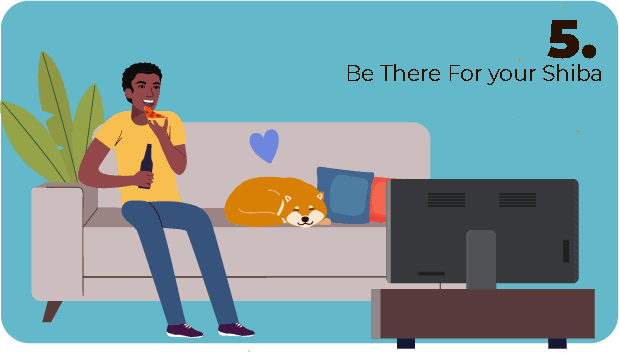
Just being there for your Shiba will help with anxiety.
However, it’s important to remember never to praise or scold your Shiba for being scared. Petting or saying “it’s okay” will confuse your Shiba because those words / actions are associated with positive things.
Basically, it’s not a good idea to say “it’s okay” when obviously your Shiba knows it isn’t. Instead just offer your Shiba your calm presence. Your Shiba will feel safer and reassured when you remain calm, confident and unperturbed by the loud sounds.
Veterinarians and animal behaviorists are still debating about whether comforting a dog during a noise event is recommended or not.
But from pouring over tons of studies and recommendations, the consensus seems to be having a neutral presence near the dog during a noise event is the most recommended.
6. Separate Dogs Based on Fear Level
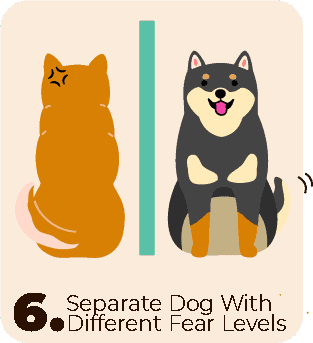
Dogs, being social animals - learn from each other.
If you have multiple dogs in your family, it’s best to keep the ones that have noise-anxiety away from your other dogs who don’t suffer from noise-anxiety during noise events.
Failing to do so could eventually lead you to having all of your dogs suffering from noise anxiety.
For example, if you know there’s going to be a noise event and you’re preparing to counter condition your dog with noise anxiety - make sure your other dogs are in another safe place away from your scared dog.
It’d be a good idea to also practice classical conditioning with the other non scared dogs by rewarding them with treats during the noise event.
Just be sure not leave your other “scared” dog alone for too long - or better yet have someone else help you with both the counter conditioning and classical conditioning therapies for all of the dogs in your clan.
7. What About Thundershirts, DAP Collars, ETC?
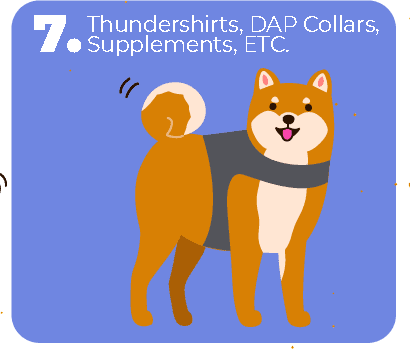
Okay, we saved these treatment options for last because the efficacy of these options are uncertain.
Popular methods such as using a “Thunder Shirt” or calming supplements may help - but only to a certain extent compared to other proven methods such as behavior modification training.
To illustrate this point - if Thunder Shirts worked most of the time, then many of us wouldn’t be here reading this article. Instead we would have a Shiba that was cured of noise anxiety simply because we bought a Thunder Shirt.
This is not to say that these tools aren’t helpful - because in many cases they are.
It’s more to point out that expectations for a curing a noise-fearful dog with solely the use of these types of tools should be minimal.
Instead, these tools can be helpful when used in conjunction with the other proven methods mentioned above. (behavior modification training, vet-prescribed medicine, relaxation)
D.A.P. Dog Appeasing Pheromone
Dog appeasing pheromone' are made synthetically to mimic the hormones of a lactating mother dog. The pheromones are what help puppies bond with mothers and is said to have an appeasing effect on both puppies and adult dogs.
The effectiveness of these synthetic pheromones shows improvement in certain situations but not others.
A critical 2014 study found that the use of D.A.P. in clinical veterinary wards did not produce scientifically significant improvement in the subjects exposed to D.A.P.
However, other studies do show some clinically significant improvements with the use of D.A.P. One of the studies shows that D.A.P. is very effective in treating dogs with fear related issues such as noise anxiety. However, in this study it provided the same recommendation of using D.A.P. adjunctly with B.M.T.’s such as counterconditioning and desensitization.
Another study involving noise-fearful Beagles showed that D.A.P. collars significantly improved fear and anxiety levels compared to placebo.
So What’s Our Take?
Given the numerous studies have shown some effectiveness, especially regarding D.A.P. collars, we believe it’s something worth trying - especially in conjunction with behavior modification therapy.
Anxiety Wraps / Thunder Shirts
"Pressure vests" work by providing constant pressure that simulates the swaddling of an infant. This simulation can cause the dog’s body to release calming hormones like oxytocin or endorphins - which supposedly helps to calm the dog.
A owner reported study found 80% of dog owners who used an anxiety wrap for thunderstorm phobia in their dogs would use the anxiety wrap again.
Whereas another owner provided survey / questionnaire found that dog pressure vests fared only a little bit better than the placebo (44>27-35)
So What’s Our Take?
These pressure vests may help some Shibas but we’re not the biggest fans. Firstly, most of our Shibas despise wearing anything other than au naturel. Plus, it’s a hassle to take on and off.
Finally, one must consider if it’s possible that the Shiba may associate noise events with a pressure vest, especially if we seem to always know when noise events are going to happen and put the vests on right before or during.
Ideally, we’d like our Shibas to learn to overcome their fears and phobias with as little use of crutches as possible. That way, it’d be easier to wean back to being in a natural state once the phobias begin to fade.
Natural Supplements
Natural supplements and chews are available that may or may not help alleviate anxiety in noise-fearful dogs.
However, just as with human supplements, the efficacy of these products as a whole is spotty at best.
Many dog owners may at first prefer to try natural supplements before using prescribed medication however there is a lack of quality peer-reviewed research on these supplements. And the ones that are available are either negative or inconclusive.
Some natural supplements available include:
Harmonease - Harmonease is an oral botanical product containing a blend of extracts of Magnolia officinalis and Phellodendron amurense. This study, shows that the product seems mildly helpful in reducing anxiety in thunderstorm-fearful Beagles.
Zylkene (Vetoquinol)- Zylkene contains a milk protein, alpha-casozepine, that binds to the benzodiazepine receptors in the brain. Which, if effective, should cause calm and relaxation with minimal sedation. A published study confirmed that Zylkene decreased stress in horses acclimating to new homes - though not much conclusive evidence found in studies involving canines.
Anxitane (L-theanine) - Anxitane is an over-the-counter chewable tablet that contains the amino acid L-theanine. This amino acid is believed to reduce anxiety in nervousness in both humans and canines. The studies? Like most other natural supplements, the famous phrase is: they may work, they could work, not sure if it does work, probably sure it does no harm at least…”
Here’s Skept-Vet’s view on the studies available:
CBD Oil and Chews - The complex and controversial nature surrounding this natural therapy probably warrants its own article.
But published research involving humans has found very promising results for conditions such as anxiety, epilepsy, and arthritis.
Not much research involving canines is yet available however this study published in 2018 is one of the first studies that has shown positive effects of CBD in dogs suffering from osteoarthritis.
Out of all of the natural supplements mentioned here, CBD is something we’d most like consider for our Shibas “if” we would be able to procure it from a safe and reputable source.
BONUS: Relaxation Training

Relaxation training is not commonly mentioned or recommended in modification training protocols. However this study, reported that 69% of owners had success with this method.
The study doesn’t indicate exactly what type of relaxation methods were used by the owners though relaxation therapy is basically training your dog to be in a relaxed state on cue.
This can be achieved via massage, classical conditioning, and operant conditioning.
Sounds complicated right?
Well, yes and no. Basically your goal is to find the best way to train your dog to relax on a specific towel on cue. But yes, this will take a LOT of time and patience, but the effort should be more than worth it.
First off, you’ll be helping your Shiba overcome a serious phobia. Secondly, this command is useful in many everyday situations. For example, the relax command is handy when you have visitors over and you need your Shiba to stay calm and in one place.
Here’s a great source to learn more about relaxation training.
So Why Are Dogs Afraid of Fireworks?
Research has shown that as many as 44% of canines have or will have some form of noise anxiety during their lifetime.
Dogs have such keen sense that it makes total sense that loud booms could easily shock their nervous systems. All dogs are genetically wired to be suspicious of sights, sounds, and smells that they can't make sense of.
Additionally, other studies have shown that certain breeds, including Shiba Inus, are more prone to noise anxiety then other breeds
Causes of Noise Anxiety in Dogs:
- Genetic disposition
- Lack of adequate puppy socialization
- Traumatic experiences
- Natural tendency of “fight or flight” response
- Aging
- Environment
- Dog owners response / actions during stimuli...
Symptoms of Noise Aversion To Fireworks
Noise anxiety in Shibas displays in a variety of ways from obvious - to not so obvious.
In many cases, owners as well as veterinarians fail to detect low-grade noise anxiety. This could cause the anxiety to worsen over time.
Obvious Signs of Noise Anxiety:
- Ear’s back, wide-eyed
- Shaking
- Pacing around
- Tail low or between legs
- Hiding / Seeking refuge
- Whining, whimpering,
- Trying to escape
- Breathing heavily for no reason
- Vocalization
Not So Obvious Signs of Noise Anxiety:
- Excessive Yawning
- Lip licking
- Unwillingness to move
- Not wanting to eat
- Aggression
- Destructive behaviors
- Inappropriate elimination
- “Freezing” - Essentially a panic attack
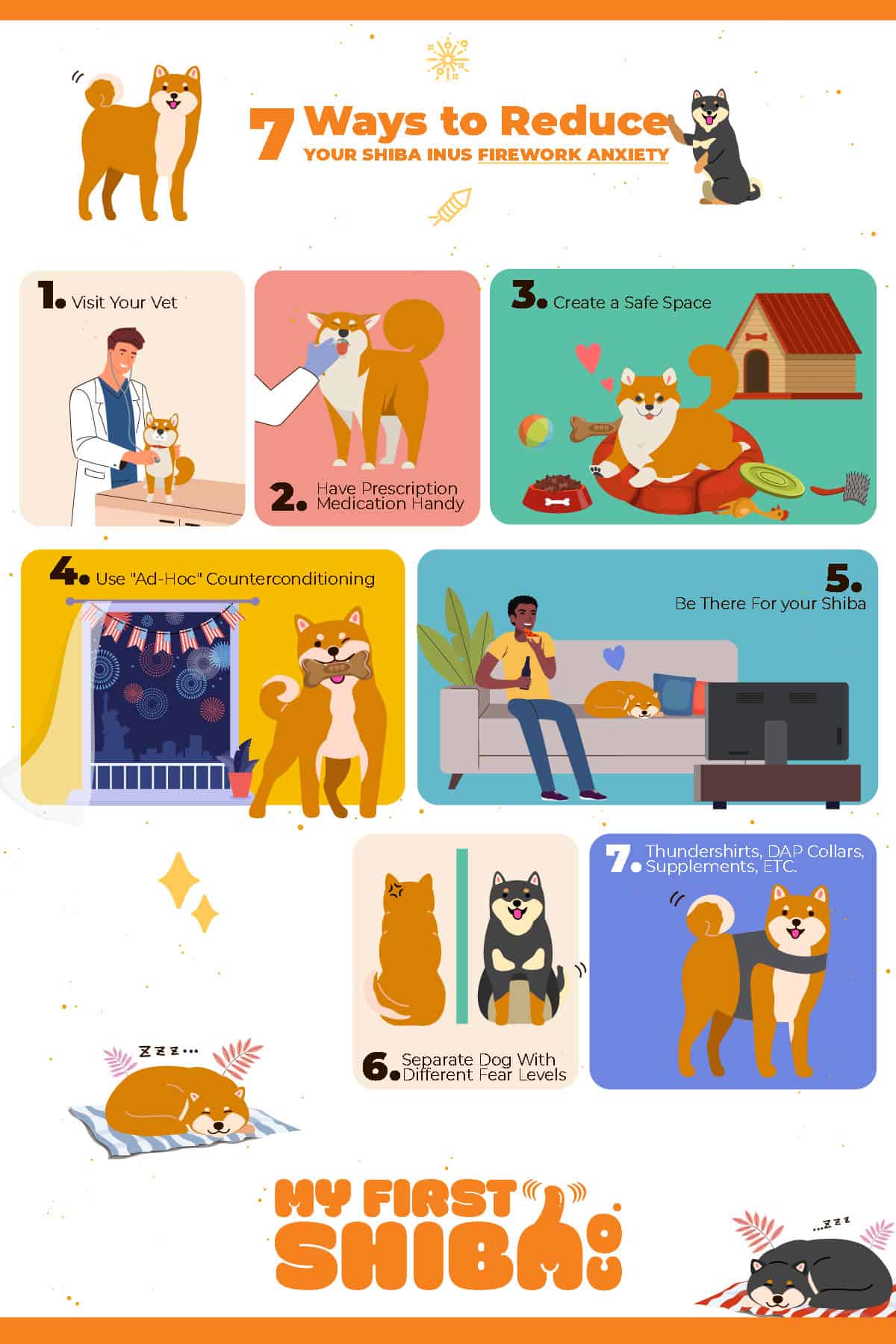
How To Teach Your Shiba Inu Puppy Not To Fear Fireworks
The very best way to reduce any future noise-related anxiety is to socialize your Shiba Inu puppy from the very start.
The fear imprint period (8-11 weeks) occurs during a Shiba Inu’s critical puppy development period. This is the time when puppies develop their understanding of the outside world. They’ll learn what and what not to fear by experiences they go through during this time.
Behavior Modification Technique: Classical Conditioning - If you introduce your Shiba Inu puppy to a variety of stimuli (loud noises, various sounds, sights) with positive associations - that puppy will be better equipped to dealing with the same stimuli throughout his or her adulthood.
If, on the other hand, you fail to take the time to introduce your puppy to adverse stimuli, your puppy is more likely to develop anxiety issues as an adult.
Long Term Effects of Noise Aversion
The exact long term consequences of noise-related anxiety is difficult to predict.
Chronic stress in dogs has been linked to weakened immune systems, stress-induced diseases, and overall lower quality of well-being.
Low grade stress / anxiety is difficult to diagnose, therefore it’s important to be aware of the not so telling symptoms of noise anxiety listed above.
What compounds this problem is the fact that many dogs go undiagnosed.
FYI - Other Types of Behavior Modification Techniques (B.M.T.)
In addition to the “ad-hoc” counter conditioning B.M.T., will these other techniques help?
Yes, definitely. With the exception of flooding, these three B.M.T. will help your Shiba overcome noise anxiety if done correctly.
Classical Conditioning -
Coined by Russian physiologist Ivan Pavlov, classical conditioning involves involuntary responses to a conditioned stimulus. For example, if every time a barbecue grill goes on and your Shiba receives a tasty piece of beef, your Shiba will eventually be “classically conditioned” to expect that beef every time the grill fires.
Operant Conditioning -
Operant conditioning, founded by American psychologist B.F. Skinner, is similar to classical conditioning with one major difference. In operant conditioning, a dog voluntarily engages in a behavior that will provide the desired consequence. Basically, your dog willfully “operates” in an action to gain a reward. For example, my Shiba learned that every time she nudges me hard enough under the dinner table, she’ll likely get a taste of the family meal.
Counter Conditioning -
Counter conditioning involves teaching your dog to unlearn an unwelcome conditioned response. For example, if your Shiba was conditioned to learn that skateboards illicit fear, with counter conditioning, you’ll teach your Shiba to associate something positive (treats, play) with skateboards instead.
Ad-Hoc Counter Conditioning - (Listed in Above Actions To Take Now)
Ad-Hoc counter conditioning is exactly the same as counter conditioning with the only difference being that it’s done “on the fly” - whereas counter conditioning and other conditioning methods can be done beforehand as part of behavior modification therapy.
This is the reason why we recommend ad-hoc counter conditioning as the first behavior modification technique to implement. Whereas the other conditioning methods require planning, time, and knowledge - ad-hoc counter conditioning can be performed “when it’s needed” as long as the owner has a basic understanding of the procedure and goals.
Desensitization -
Desensitization is exactly what it sounds like - reducing sensitivity and emotional responses to a trigger. Desensitization must be done in a carefully planned manner involving small baby steps of gradually increasing exposure to the offending trigger.
So in the case of firework fear, a specially developed firework simulation CD would be used at the absolute lowest volume to start. The volume can only be increased when your Shiba seems comfortable. If you notice any fearful responses, the volume must be dialed back. Failing to follow these precautions could result in worsening your Shiba's fear.
The use of desensitization and counter conditioning has been described as a “one-two punch” against fear. Basically counter conditioning as the “ice cream” and desensitization as the “cherry and cream” on the top.
Management -
Management involves setting your Shiba Inu up for success to begin with. For instance, if you know there’s going to be a firework show in the evening - you’d take all necessary steps to manage your dog’s environment beforehand.
This could involve setting up your Shiba’s safe space, getting music or white noise ready, having all the windows closed with A.C. on to reduce noise coming into the house, and having tasty treats on hand for counter conditioning exercises during the noise.
Flooding -
Flooding involves forcefully exposing your dog to the fear trigger in hopes that with enough flooding, the fear should eventually fade.
While this works in some cases, it shouldn’t even be considered as it could worsen your dog’s fear while traumatizing him / her at the same time. This is the technique, Cesar Milan of the Dog Whisperer uses in his various t.v. shows.
Wrapping It Up
The sheer amount of information in this article can seem overwhelming. However, your Shiba Inu's noise phobia issue feels just as overwhelming to him / her.
Fears, phobias, and anxieties are complex and may take quite a bit of time and effort to resolve. By taking the time to learn the proper methodologies to combat the issue - you are setting yourself up well to help your Shiba(s) the best you can.
Thanks for visiting Myfirstshiba.com! We do our very best in providing our readers with awesome content about our beloved Shiba Inu breed. Some of our articles include reviews and recommendations to our favorite products. We do occasionally earn commissions from certain affiliate links that help support our work and mission. Thanks again for visiting. Shiba Kisses To All!
